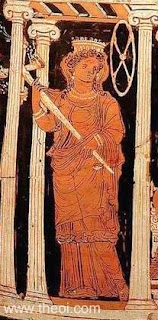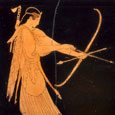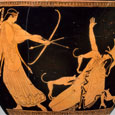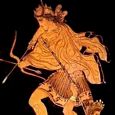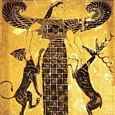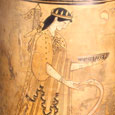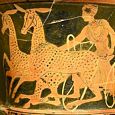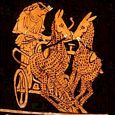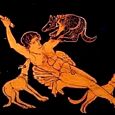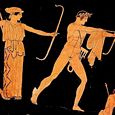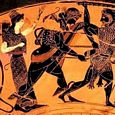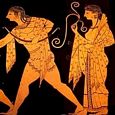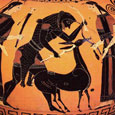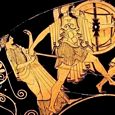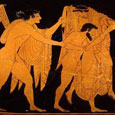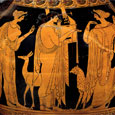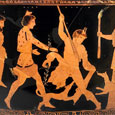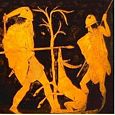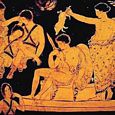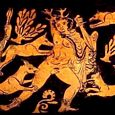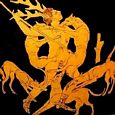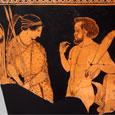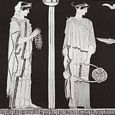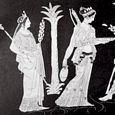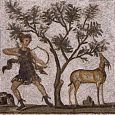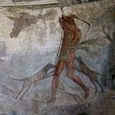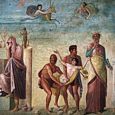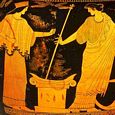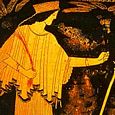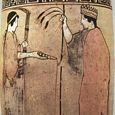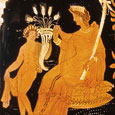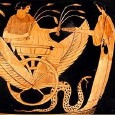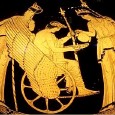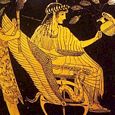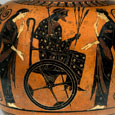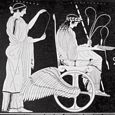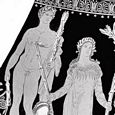this blog contains quotes for Myths,Magic,Paganism,Legends,Wicca,Monsters etc...i hope to like it..You can comment if you like!!!!
Παρασκευή 28 Σεπτεμβρίου 2012
ARTEMIS
ARTEMIS was the great Olympian goddess of hunting, wilderness and
wild animals. She was also a goddess of childbirth, and the protectress
of the girl child up to the age of marriage. Her twin brother Apollon
was similarly the protector of the boy child. Together the two gods
were also bringers of sudden death and disease--Artemis targetted women
and girls, and Apollon men and boys.
In ancient art Artemis was usually depicted as a girl dressed in a short knee-length chiton and equipped with a hunting bow and quiver of arrows.
Some of the best known myths featuring the goddess include:--
"Mousa, sing of Artemis, sister of the far-shooter (hekatos), Parthenosthe virgin who delights in arrows (iokheaira), who was fostered with Apollon. She waters her horses from Meles deep in reeds [a river in Lydia], and swifty drives her all-golden chariot through Smyrna to vine-clad Klaros (Claros) where Apollon god of the silver bow (argyrotoxos), sits waiting for far-shooting delighter in arrows (hekatebolon iokheaira).
And so hail to you, Artemis, in my song and to all goddesses as well. Of you first I sing and with you I begin; now that I have begun with you, I will turn to another song."
Homeric Hymn 27 to Artemis :
"I sing of Artemis with shafts are of gold (khryselakatos), strong-voiced (keladeine), the revered virgin (parthenon aidoine), dear-shooting (elaphebolos), delighter in arrows (iokheaira), own sister to Apollon of the golden sword (khrysaor). Over the shadowy hills and windy peaks she draws her golden bow, rejoicing in the chase, and sends out grievous shafts. The tops of the high mountains tremble and the tangled wood echoes awesomely with the outcry of beasts: earth quakes and the sea also where fishes shoal. But the goddess with a bold heart turns every way destroying the race of wild beasts: and when she is satisfied and has cheered her heart, then the huntress who delights in arrows (theroskopos iokheaira) slackens her supple bow and goes to the great house of her dear brother Phoibos Apollon, to the rich land of Delphoi, there to order the lovely dance of the Mousai (Muses) and Kharites (Charites, Graces). There she hangs up her curved bow and her arrows, and heads and leads the dances, gracefully arrayed, while all they utter their heavenly voice, singing how neat-ankled Leto bare children supreme among the immortals both in thought and deed.
Hail to you, children of Zeus and rich-haired Leto! And now I will remember you and another song also."
Homeric Hymn 5 to Aphrodite 18 ff :
"Artemis with shafts of gold (khryselakatos) loves archery and the slaying of wild beasts in the mountains, the lyre also and dancing and strong-voiced song and shady woods and the cities of upright men."
"Of Artemis we hymn--no light thing is it for singers to forget her - whose study is the bow and the shooting of hares and the spacious dance and sport upon the mountains. [The story of her birth and childhood follow, see The Childhood of Artemis for this part of the hymn.] . . .
The fourth time [Artemis shot her bow]--not long was it ere thou didst shoot at the city of unjust me, those who to one another and those who towards strangers wrought many deeds of sin, forward men, on whom thou wilt impress thy grievous wrath. On their cattle plague feeds, on their tilth feeds frost, and the old men cut their hair in mourning over their sons, and their wives either are smitten or die in childbirth, or, if they escape, bear birds whereof none stands on upright ankle.
But on whomsoever thou lookest smiling and gracious, for them the tilth bears the corn-ear abundantly, and abundantly prospers the four-footed breed, and abundant waxes their prosperity: neither do they go to the tomb, save when they carry thither the aged. Nor does faction wound their race--faction which ravages even the well-established houses: but brother's wife and husband's sister set their chairs around one board . . .
Lady, of that number be whosoever is a true friend of mine, and of that number may I be myself, O Queen. And may song be my study forever. In that song shall be the Marriage of Leto; therein thy name shall often-times be sung; therein shall Apollon be and therein all thy labours, and therein thy hounds and thy bow and thy chariot, which lightly carry thee in thy splendour, when thou drivest to the house of Zeus . . .
But when the Nymphai encircle thee in the dance, near the springs of Aigyptian (Egyptian) Inopos [on the island of Delos] or Pitane [in Aiolia or Lakonia]--for Pitane too is thine--or in Limnai [in Lakonia] or where, goddess, thou camest from Skythia to dwell, in Alai Araphenides [i.e. Brauron in Attika], renouncing the rites of the Tauroi [of Skythia], then may not my kine cleave a four-acred fallow field for a wage at the hand of an alien ploughman; else surely lame and weary of neck would they come to the byre, yea even were they of Stymphaian breed, nine years of age, drawing by the horns; which kine are far the best for cleaving a deep furrow; for the god Helios never passes by that beauteous dance, but stays his car to gaze upon the sight, and the lights of day are lengthened.
Which now of islands, what hill finds most favour with thee? What haven? What city? Which of the Nymphai (NYmphs) dost thou love above the rest, and what heroines hast thou taken for thy companions? Say, goddess, thou to me, and I will sing thy saying to others. Of islands, Dolikhe [Ikaria] hath found favour with thee, of cities Perge [in Pamphylia], of hills Taygetos [in Lakedaimonia], the havens of Euripos [Euboia].
And beyond others thou lovest the Nymphe of Gortyn, Britomartis, slayer of stags, the goodly archer . . . Yea and Kyrene thou madest thy comrade, to whom on a time thyself didst give two hunting dogs, with whom the maiden daughter of Hypseus beside the Iolkian tomb won the prize.And the fair-haired [Prokris] wife of Kephalos, son of Deioneus, O Lady, thou madest thy fellow in the chase and fair Antikleia [mother of Odysseus], they say, thou dist love even as thine own eyes. These were the first who wore the gallant bow and arrow-holding quivers on their shoulders; their right shoulders bore the quiver strap, and always the right breast showed bare. Further thou dist greatly commend swift-footed Atalanta, the slayer of boards, daughter of Arkadian Iasios, and taught her hunting with dogs and good archery . . .
Lady of many shrines, of many cities, hail! Khitone (Goddess of the Tunic), sojourner in Miletos; for thee did Neleus [i.e. the founder of Miletos] make his Guide, when he put off with his ships from the land of Kekrops [i.e. Attika].
Khesias (Lady of Khesion) and Imbrasia (Lady of Imbrasos), throned in the highest, to thee in thy shrine did Agamemnon dedicate the rudder of his ship, a charm against ill weather, when thou didst bind the winds for him, what time the Akhaian ships sailed to vex the cities of the Teukroi [i.e. the Trojans], wroth for Rhamnusian Helene.
For thee surely Proitos established two shrines, one of Artemis Kore (Maidenhood) for that thou dist gather for him his maiden daughters, when they were wandering over the Azanian hills; the other he founded in Lousa to Artemis Hemere (the Gentle), because thou tookest from his daughters the spirit of wildness.
For thee, too, the Amazones, whose mind is set on war, in Ephesos beside the sea established an image beneath an oak trunk, and Hippo [an Amazon queen] performed a holy rite for thee, and they themselves, O Oupis Queen, around the image danced a war-dance--first in shields and armour, and again in a circle arraying a spacious choir. And the loud pipes thereto piped shrill accompaniment, that they might foot the dance together (for not yet did they pierce the bones of the fawn [to create flutes], Athene's handiwork, a bane to the deer). And the echo reached unto Sardis and to the Berekynthian range [in Phrygia]. And they with their feet geat loudly and therewith their quivers rattled. And afterwards around that image was raised a shrine of broad foundations. That it shall dawn behold nothing more divine, naught richer. Easily would it outdo Pytho [Delphoi].
Wherefore in this madness insolent Lygdamis threatened that he would lay it waste, and brought against it a host of Kimmerians which milk mares, in number as the sand; who have their homes hard by the Straights of the cow, daughter of Inakhos. Ah! Foolish among kings, how greatly he sinned! For not destined to return again to Skythia was either he or any other of those whose wagons stood in the Kaytrian plain [of Lydia]; for thy shafts are ever more set as a defense before Ephesos. O Mounikhia (Lady of Mounykhia), Limenoskope (Watcher of Harbours), hail, Pheraia (Lady of Pherai)!
Let none disparage Artemis. For Oineus dishonoured her altar and no pleasant struggles came upon his city.
Nor let any contend with her in shooting of stags or in archery. For the son of Atreus [Agamemnon] vaunted him not that he suffered small requital. Neither let any woo the Maiden; for not Otos, nor Orion wooed her to their own good. Nor let any shun the yearly dance; for not tearless to Hippo [an Amazon queen] was her refusal to dance around the altar. Hail, great queen, and graciously greet my song."
"To Prothyraia [Artemis], Fumigation from Storax. O venerable Goddess, hear my prayer, for labour pains are thy peculiar care. In thee, when stretched upon the bed of grief, the sex, as in a mirror, view relief. Guard of the race, endued with gentle mind, to helpless youth benevolent and kind; benignant nourisher; great nature's key belongs to no divinity but thee. Thou dwellest with all immanifest to sight, and solemn festivals are thy delight. Thine is the task to loose the virgin's zone and thou in every work art seen and known. With births you sympathise, though pleased to see the numerous offspring of fertility. When racked with labour pangs, and sore distressed the sex invoke thee, as the soul's sure rest; for thou Eileithyia alone canst give relief to pain, which art attempts to ease, but tries in vain. Artemis Eileithyia, venerable power, who bringest relief in labour's dreadful hour; hear, Prothyraia and make the infant race thy constant care."
Orphic Hymn 36 to Artemis :
"To Artemis, Fumigation from Manna. Hear me, Zeus' daughter, celebrated queen, Bromia and Titanis, of a noble mien: in darts rejoicing, and on all to shine, torch-bearing Goddess, Diktynna divine. Over births presiding, and thyself a maid, to labour pangs imparting ready aid: dissolver of the zone, and wrinkled care, fierce huntress, glorying in the sylvan war: swift in the course, in dreadful arrows skilled, wandering by night, rejoicing in the field: of manly form, erect, of bounteous mind, illustrious Daimon, nurse of humankind: immortal, earthly, bane of monsters fell, 'tis thine, blest maid, on woody mounts to dwell: foe of the stag, whom woods and dogs delight, in endless youth you flourish fair and bright. O universal queen, august, divine, a various form, Kydonian power, is thine. Dread guardian Goddess, with benignant mind, auspicious come, to mystic rites inclined; give earth a store of beauteous fruits to bear, send gentle peace, and health with lovely hair, and to the mountains drive disease and care."
Homer, Odyssey 6. 102 ff (trans. Shewring) (Greek epic C8th B.C.) :
"With head and forehead Artemis overtops the rest [of her companion Nymphai], and though all are lovely, there is no mistaking which is she."
Homer, Odyssey 6. 151 ff :
"[Odysseus addresses Nausikaa:] ‘You are most like Artemis, daughter of sovereign Zeus; you are tall as she is, lovely as she is, you have her air.’"
Homer, Odyssey 17. 37 & 19. 54 :
"Penelope came from her room, looking like Artemis [i.e. in chastity] or like golden Aphrodite [i.e. in beauty]."
Apollonius Rhodius, Argonautica 3. 879 ff (trans. Rieu) (Greek epic C3rd B.C.) :
"Artemis, standing in her golden chariot after she has bathed in the gently water of Parthenios or the streams of Amnisos, and driving off with her fast-trotting deer over the hills and far away to some rich-scented sacrifice. Attendant Nymphai have gathered at the source of Amnisos or flocked in from the glens and upland springs to follow her; and fawning beasts whimper in homage and tremble as she passes by."
Callimachus, Hymn 3 to Artemis 10 ff (trans. Mair) (Greek poet C3rd B.C.) :
"Give me [Artemis] arrows and a bow . . . and give me to gird me in a tunic with embroidered border reaching to the knee, that I may slay wild beasts."
Pausanias, Description of Greece 5. 19. 5 (trans. Jones) (Greek travelogue C2nd A.D.) :
"[Amongst the figures depicted on the chest of Kypselos dedicated at Olympia:] Artemis has wings on her shoulders . . . in her right hand she grips a leopard, in her left a lion."
Pausanias, Description of Greece 8. 37. 1 :
"[From a description of a cult statue:] Artemis wrapped in the skin of a deer, and carrying a quiver on her shoulders, while in one hand she holds a torch, in the other two serpents; by her side a bitch, of a breed suitable for hunting, is lying down."
Ovid, Metamorphoses 3. 138 ff (trans. Melville) (Roman epic C1st B.C. to C1st A.D.) :
"She [Artemis] stood taller, a head taller than them all [her attendant Nymphai]."
Nonnus, Dionysiaca 48. 302 ff (trans. Rouse) (Greek epic C5th A.D.) :
"[Artemis] and maiden Aura mounted the car [Artemis' chariot], took reins and whip and drove the horned team [of deer] like a tempest. The unveiled daughters of everflowing Okeanos her servants made haste to accompany the Archeress: one moved her swift knees as her queen's forerunner, another tucked up her tunic and ran level not far off, a third laid a hand on the basket of the swiftmoving car and ran alongside. Archeress diffusing radiance from her face stood shining above her attendants . . . The goddess [Artemis] leapt out of her car [of her chariot]; Oupis took the bow from her shoulders, and Hekaerge the quiver; the daughters of Okeanos took off the well-strung hunting nets, and another took charge of the dogs; Loxo loosed the boots from her feet."
In ancient art Artemis was usually depicted as a girl dressed in a short knee-length chiton and equipped with a hunting bow and quiver of arrows.
Some of the best known myths featuring the goddess include:--
- Her birth, immediately following which she assisted her mother in the birth of her twin brother Apollon;
- The Trojan War where she was beaten by Hera in an angry contest of the gods;
- The hunter Aktaion who encountered the goddess whilst she was bathing and was turned into a stag;
- The Aloadai giants who attempted to storm Olympos but were tricked by Artemis into killing each other;
- The sacrifice of Iphigeneia whom King Agamemnon offered to her for the passage of the Greek fleet to Troy;
- The giant Orion, a close companion of the goddess, who was slain by the goddess or her jealous brother;
- The Kalydonian boar sent by Artemis to ravage Kaldyon;
- The nymph Kallisto, a companion of Artemis, who was seduced by Zeus in the guise of the goddess.
|
| Her name at Sparta was Orthia,
with reference to the phallus, or because her statue stood erect.
According to another tradition, Orestes and Iphigeneia concealed the
image of the Taurian goddess in a bundle of brushwood, and carried it to
Aricia in Latium. Iphigeneia, who was at first to have been sacrificed
to Artemis, and then became her priestess, was afterwards identified
with the goddess (Herod. iv. 103; Paus. i. 43. § 1), who was worshipped
in some parts of Greece, as at Hermione, under the name of Iphigeneia.
(Paus. ii. 35. § 1.) Some traditions stated, that Artemis made
Iphigeneia immortal, in the character of Hecate, the goddess of the
moon. A kindred divinity, if not the same as the Taurian Artemis, is Artemis tauropolos, whose worship was connected with bloody sacrifices, and who produced madness in the minds of men, at least the chorus in the Ajax of Sophocles, describes the madness of Ajax as the work of this divinity. In the legends about the Taurian Artemis, it seems that separate local traditions of Greece are mixed up with the legends of some Asiatic divinity, whose symbol in the heaven was the moon, and on the earth the cow. 4. The Ephesian Artemis was a divinity totally distinct from the Greek goddess of the same name. She seems to have been the personification of the fructifying and all-nourishing powers of nature. It is an opinion almost universally adopted, that she was an ancient Asiatic divinity whose worship the Greeks found established in Ionia, when they settled there, and that, for some resemblance they discovered, they applied to her the name of Artemis. As soon as this identity of the Asiatic goddess with the Greek Artemis was recognised, other features, also originally peculiar to the Greek Artemis, were transferred to her; and thus she is called a daughter of Leto, who gave birth to her in the neighbourhood of Ephesus. Her original character is sufficiently clear from the fact, that her priests were eunuchs, and that her image in the magnificent temple of Ephesus represented her with many breasts (polumastos). The whole figure of the goddess resembled a mummy : her head was surmounted with a mural crown (corona muralis), and the lower part of her body, which ended in a point, like a pyramid upside down, was covered with figures of mystical animals. (Strab. xiv. p. 641; Paus. iv. 31. § 6, vii. 5. § 2., The symbol of this divinity was a bee, and her highpriest bore the name of king (essên). Her worship was said to have been established at Ephesus by the Amazons. (Paus. ii. 7. § 4, viii. 12. § 1; Hesych. and Suid. s. v. essên.) Respecting some other divinities, or attributes of divinities, which were likewise regarded as identical with Artemis in Greece, see Britomartis, Dictynna, and EileithyiaI. The Romans identified their goddess Diana with the Greek Artemis, and at a comparatively early time they transferred to their own goddess all the peculiar features of the Greek Artemis. The worship of Artemis was universal in all Greece, in Delos, Crete, Sicily, and southern Italy, but more especially in Arcadia and the whole of the Peloponnesus. The sacrifices offered to the Brauronian Artemis consisted of stags and goats; in Thrace dogs were offered to Artemis. Among the animals sacred to the Greek Artemis we may mention the stag, boar, dog, and others; the fir-tree was likewise sacred to her. It is impossible to trace the various relations in which Artemis appears to us to one common source, or to one fundamental idea : the very manner in which such a complicated mythus was formed renders the attempt futile, or, to say the least, forced. In the case of Artemis, it is evident, that new elements and features were added in various places to the ancient local mythus; the worship of one divinity is identified with that of another, and the legends of the two are mixed up into one, or those of the one are transferred to the other, whose legends then sink into oblivion. The representations of the Greek Artemis in works of art are different accordingly as she is represented either as a huntress, or as the goddess of the moon; yet in either case she appears as a youthful and vigorous divinity, as becomes the sister of Apollo. As the huntress, she is tall, nimble, and has small hips; her forehead is high, her eyes glancing freely about, and her hair tied up behind in such a manner, that some locks float down her neck; her breast is covered, and the legs up to the knees are naked, the rest being covered by the chlamys. Her attributes are the bow, quiver, and arrows, or a spear, stags, and dogs. As the goddess of the moon, she wears a long robe which reaches down to her feet, a veil covers her head, and above her forehead rises the crescent of the moon. In her hand she often appears holding a torch. Source: Dictionary of Greek and Roman Biography and Mythology. |
HYMNS TO ARTEMIS
I) THE HOMERIC HYMNS
Homeric Hymn 9 to Artemis (trans. Evelyn-White) (Greek epic C7th to 4th B.C.) :"Mousa, sing of Artemis, sister of the far-shooter (hekatos), Parthenosthe virgin who delights in arrows (iokheaira), who was fostered with Apollon. She waters her horses from Meles deep in reeds [a river in Lydia], and swifty drives her all-golden chariot through Smyrna to vine-clad Klaros (Claros) where Apollon god of the silver bow (argyrotoxos), sits waiting for far-shooting delighter in arrows (hekatebolon iokheaira).
And so hail to you, Artemis, in my song and to all goddesses as well. Of you first I sing and with you I begin; now that I have begun with you, I will turn to another song."
Homeric Hymn 27 to Artemis :
"I sing of Artemis with shafts are of gold (khryselakatos), strong-voiced (keladeine), the revered virgin (parthenon aidoine), dear-shooting (elaphebolos), delighter in arrows (iokheaira), own sister to Apollon of the golden sword (khrysaor). Over the shadowy hills and windy peaks she draws her golden bow, rejoicing in the chase, and sends out grievous shafts. The tops of the high mountains tremble and the tangled wood echoes awesomely with the outcry of beasts: earth quakes and the sea also where fishes shoal. But the goddess with a bold heart turns every way destroying the race of wild beasts: and when she is satisfied and has cheered her heart, then the huntress who delights in arrows (theroskopos iokheaira) slackens her supple bow and goes to the great house of her dear brother Phoibos Apollon, to the rich land of Delphoi, there to order the lovely dance of the Mousai (Muses) and Kharites (Charites, Graces). There she hangs up her curved bow and her arrows, and heads and leads the dances, gracefully arrayed, while all they utter their heavenly voice, singing how neat-ankled Leto bare children supreme among the immortals both in thought and deed.
Hail to you, children of Zeus and rich-haired Leto! And now I will remember you and another song also."
Homeric Hymn 5 to Aphrodite 18 ff :
"Artemis with shafts of gold (khryselakatos) loves archery and the slaying of wild beasts in the mountains, the lyre also and dancing and strong-voiced song and shady woods and the cities of upright men."
II) HELLENISTIC HYMNS
Callimachus, Hymn 3 to Artemis (trans. Mair) (Greek poet C3rd B.C.) :"Of Artemis we hymn--no light thing is it for singers to forget her - whose study is the bow and the shooting of hares and the spacious dance and sport upon the mountains. [The story of her birth and childhood follow, see The Childhood of Artemis for this part of the hymn.] . . .
The fourth time [Artemis shot her bow]--not long was it ere thou didst shoot at the city of unjust me, those who to one another and those who towards strangers wrought many deeds of sin, forward men, on whom thou wilt impress thy grievous wrath. On their cattle plague feeds, on their tilth feeds frost, and the old men cut their hair in mourning over their sons, and their wives either are smitten or die in childbirth, or, if they escape, bear birds whereof none stands on upright ankle.
But on whomsoever thou lookest smiling and gracious, for them the tilth bears the corn-ear abundantly, and abundantly prospers the four-footed breed, and abundant waxes their prosperity: neither do they go to the tomb, save when they carry thither the aged. Nor does faction wound their race--faction which ravages even the well-established houses: but brother's wife and husband's sister set their chairs around one board . . .
Lady, of that number be whosoever is a true friend of mine, and of that number may I be myself, O Queen. And may song be my study forever. In that song shall be the Marriage of Leto; therein thy name shall often-times be sung; therein shall Apollon be and therein all thy labours, and therein thy hounds and thy bow and thy chariot, which lightly carry thee in thy splendour, when thou drivest to the house of Zeus . . .
But when the Nymphai encircle thee in the dance, near the springs of Aigyptian (Egyptian) Inopos [on the island of Delos] or Pitane [in Aiolia or Lakonia]--for Pitane too is thine--or in Limnai [in Lakonia] or where, goddess, thou camest from Skythia to dwell, in Alai Araphenides [i.e. Brauron in Attika], renouncing the rites of the Tauroi [of Skythia], then may not my kine cleave a four-acred fallow field for a wage at the hand of an alien ploughman; else surely lame and weary of neck would they come to the byre, yea even were they of Stymphaian breed, nine years of age, drawing by the horns; which kine are far the best for cleaving a deep furrow; for the god Helios never passes by that beauteous dance, but stays his car to gaze upon the sight, and the lights of day are lengthened.
Which now of islands, what hill finds most favour with thee? What haven? What city? Which of the Nymphai (NYmphs) dost thou love above the rest, and what heroines hast thou taken for thy companions? Say, goddess, thou to me, and I will sing thy saying to others. Of islands, Dolikhe [Ikaria] hath found favour with thee, of cities Perge [in Pamphylia], of hills Taygetos [in Lakedaimonia], the havens of Euripos [Euboia].
And beyond others thou lovest the Nymphe of Gortyn, Britomartis, slayer of stags, the goodly archer . . . Yea and Kyrene thou madest thy comrade, to whom on a time thyself didst give two hunting dogs, with whom the maiden daughter of Hypseus beside the Iolkian tomb won the prize.And the fair-haired [Prokris] wife of Kephalos, son of Deioneus, O Lady, thou madest thy fellow in the chase and fair Antikleia [mother of Odysseus], they say, thou dist love even as thine own eyes. These were the first who wore the gallant bow and arrow-holding quivers on their shoulders; their right shoulders bore the quiver strap, and always the right breast showed bare. Further thou dist greatly commend swift-footed Atalanta, the slayer of boards, daughter of Arkadian Iasios, and taught her hunting with dogs and good archery . . .
Lady of many shrines, of many cities, hail! Khitone (Goddess of the Tunic), sojourner in Miletos; for thee did Neleus [i.e. the founder of Miletos] make his Guide, when he put off with his ships from the land of Kekrops [i.e. Attika].
Khesias (Lady of Khesion) and Imbrasia (Lady of Imbrasos), throned in the highest, to thee in thy shrine did Agamemnon dedicate the rudder of his ship, a charm against ill weather, when thou didst bind the winds for him, what time the Akhaian ships sailed to vex the cities of the Teukroi [i.e. the Trojans], wroth for Rhamnusian Helene.
For thee surely Proitos established two shrines, one of Artemis Kore (Maidenhood) for that thou dist gather for him his maiden daughters, when they were wandering over the Azanian hills; the other he founded in Lousa to Artemis Hemere (the Gentle), because thou tookest from his daughters the spirit of wildness.
For thee, too, the Amazones, whose mind is set on war, in Ephesos beside the sea established an image beneath an oak trunk, and Hippo [an Amazon queen] performed a holy rite for thee, and they themselves, O Oupis Queen, around the image danced a war-dance--first in shields and armour, and again in a circle arraying a spacious choir. And the loud pipes thereto piped shrill accompaniment, that they might foot the dance together (for not yet did they pierce the bones of the fawn [to create flutes], Athene's handiwork, a bane to the deer). And the echo reached unto Sardis and to the Berekynthian range [in Phrygia]. And they with their feet geat loudly and therewith their quivers rattled. And afterwards around that image was raised a shrine of broad foundations. That it shall dawn behold nothing more divine, naught richer. Easily would it outdo Pytho [Delphoi].
Wherefore in this madness insolent Lygdamis threatened that he would lay it waste, and brought against it a host of Kimmerians which milk mares, in number as the sand; who have their homes hard by the Straights of the cow, daughter of Inakhos. Ah! Foolish among kings, how greatly he sinned! For not destined to return again to Skythia was either he or any other of those whose wagons stood in the Kaytrian plain [of Lydia]; for thy shafts are ever more set as a defense before Ephesos. O Mounikhia (Lady of Mounykhia), Limenoskope (Watcher of Harbours), hail, Pheraia (Lady of Pherai)!
Let none disparage Artemis. For Oineus dishonoured her altar and no pleasant struggles came upon his city.
Nor let any contend with her in shooting of stags or in archery. For the son of Atreus [Agamemnon] vaunted him not that he suffered small requital. Neither let any woo the Maiden; for not Otos, nor Orion wooed her to their own good. Nor let any shun the yearly dance; for not tearless to Hippo [an Amazon queen] was her refusal to dance around the altar. Hail, great queen, and graciously greet my song."
III) THE ORPHIC HYMNS
Orphic Hymn 2 to Prothhyraea (trans. Taylor) (Greek hymns C3rd B.C. to 2nd A.D.) :"To Prothyraia [Artemis], Fumigation from Storax. O venerable Goddess, hear my prayer, for labour pains are thy peculiar care. In thee, when stretched upon the bed of grief, the sex, as in a mirror, view relief. Guard of the race, endued with gentle mind, to helpless youth benevolent and kind; benignant nourisher; great nature's key belongs to no divinity but thee. Thou dwellest with all immanifest to sight, and solemn festivals are thy delight. Thine is the task to loose the virgin's zone and thou in every work art seen and known. With births you sympathise, though pleased to see the numerous offspring of fertility. When racked with labour pangs, and sore distressed the sex invoke thee, as the soul's sure rest; for thou Eileithyia alone canst give relief to pain, which art attempts to ease, but tries in vain. Artemis Eileithyia, venerable power, who bringest relief in labour's dreadful hour; hear, Prothyraia and make the infant race thy constant care."
Orphic Hymn 36 to Artemis :
"To Artemis, Fumigation from Manna. Hear me, Zeus' daughter, celebrated queen, Bromia and Titanis, of a noble mien: in darts rejoicing, and on all to shine, torch-bearing Goddess, Diktynna divine. Over births presiding, and thyself a maid, to labour pangs imparting ready aid: dissolver of the zone, and wrinkled care, fierce huntress, glorying in the sylvan war: swift in the course, in dreadful arrows skilled, wandering by night, rejoicing in the field: of manly form, erect, of bounteous mind, illustrious Daimon, nurse of humankind: immortal, earthly, bane of monsters fell, 'tis thine, blest maid, on woody mounts to dwell: foe of the stag, whom woods and dogs delight, in endless youth you flourish fair and bright. O universal queen, august, divine, a various form, Kydonian power, is thine. Dread guardian Goddess, with benignant mind, auspicious come, to mystic rites inclined; give earth a store of beauteous fruits to bear, send gentle peace, and health with lovely hair, and to the mountains drive disease and care."
|
|
|
| SCULPTURE see Artemis Cult 1, Artemis Cult 2, Artemis Cult 3, Artemis Cult 4 |
PHYSICAL DESCRIPTIONS OF ARTEMIS
Classical literature offers only a few, brief descriptions of the physical characteristics of the gods.Homer, Odyssey 6. 102 ff (trans. Shewring) (Greek epic C8th B.C.) :
"With head and forehead Artemis overtops the rest [of her companion Nymphai], and though all are lovely, there is no mistaking which is she."
Homer, Odyssey 6. 151 ff :
"[Odysseus addresses Nausikaa:] ‘You are most like Artemis, daughter of sovereign Zeus; you are tall as she is, lovely as she is, you have her air.’"
Homer, Odyssey 17. 37 & 19. 54 :
"Penelope came from her room, looking like Artemis [i.e. in chastity] or like golden Aphrodite [i.e. in beauty]."
Apollonius Rhodius, Argonautica 3. 879 ff (trans. Rieu) (Greek epic C3rd B.C.) :
"Artemis, standing in her golden chariot after she has bathed in the gently water of Parthenios or the streams of Amnisos, and driving off with her fast-trotting deer over the hills and far away to some rich-scented sacrifice. Attendant Nymphai have gathered at the source of Amnisos or flocked in from the glens and upland springs to follow her; and fawning beasts whimper in homage and tremble as she passes by."
Callimachus, Hymn 3 to Artemis 10 ff (trans. Mair) (Greek poet C3rd B.C.) :
"Give me [Artemis] arrows and a bow . . . and give me to gird me in a tunic with embroidered border reaching to the knee, that I may slay wild beasts."
Pausanias, Description of Greece 5. 19. 5 (trans. Jones) (Greek travelogue C2nd A.D.) :
"[Amongst the figures depicted on the chest of Kypselos dedicated at Olympia:] Artemis has wings on her shoulders . . . in her right hand she grips a leopard, in her left a lion."
Pausanias, Description of Greece 8. 37. 1 :
"[From a description of a cult statue:] Artemis wrapped in the skin of a deer, and carrying a quiver on her shoulders, while in one hand she holds a torch, in the other two serpents; by her side a bitch, of a breed suitable for hunting, is lying down."
Ovid, Metamorphoses 3. 138 ff (trans. Melville) (Roman epic C1st B.C. to C1st A.D.) :
"She [Artemis] stood taller, a head taller than them all [her attendant Nymphai]."
Nonnus, Dionysiaca 48. 302 ff (trans. Rouse) (Greek epic C5th A.D.) :
"[Artemis] and maiden Aura mounted the car [Artemis' chariot], took reins and whip and drove the horned team [of deer] like a tempest. The unveiled daughters of everflowing Okeanos her servants made haste to accompany the Archeress: one moved her swift knees as her queen's forerunner, another tucked up her tunic and ran level not far off, a third laid a hand on the basket of the swiftmoving car and ran alongside. Archeress diffusing radiance from her face stood shining above her attendants . . . The goddess [Artemis] leapt out of her car [of her chariot]; Oupis took the bow from her shoulders, and Hekaerge the quiver; the daughters of Okeanos took off the well-strung hunting nets, and another took charge of the dogs; Loxo loosed the boots from her feet."
The Mythology of Artemis
|
The Mythology of Artemis
|
||
 |
||
|
Night of the Hunters: Artemis and Apollo
Classical Mythology
Night of the Hunters: Artemis and Apollo
Classical Mythology
- The A Team: Olympians All
- First in War, First in Peace: Athena
- Three's a Crowd: The Olympian Love Triangle
- First of the Red-Hot Lovers: Aphrodite
- Night of the Hunters: Artemis and Apollo
- The Little Rascal: Hermes
Logos
Ortygia means “quail island.” Asteria, Leto's sister and the mother of the goddess Hecate, had escaped the lecherous pursuit of Zeus by turning herself into a quail and diving into the sea. The island of Ortygia appeared on the spot. After the births of Artemis and Apollo, the island's name changed to Delos, which can mean “famous.” It was renowned as one of the holiest places in ancient Greece.Immediately after her own birth, the newborn Artemis precociously helped her mother through nine days of labor and delivery until her brother Apollo emerged. Themis, Leto's aunt, took care of the young gods and nourished them on ambrosia and nectar—the food and drink of the gods.
Artemis and Apollo cherished their mother, who had gone through such an ordeal to bring them into the world. Not long after their birth, the giant Tityus attempted to rape Leto in a sacred grove near Delphi. Leto called out the names of her children, who quickly rescued her by showering arrows upon the giant, killing him instantly. For Tityus's offense, Zeus consigned the giant (who was his own son) to eternal torment in the Underworld (see What the Hell? Adventures in the Underworld).
Artemis and Apollo also defended their mother's honor (or perhaps their own pride) when Niobe, the daughter of Tantalus, boasted of having more and better children than Leto. The two killed most (or all) of Niobe's children, leaving Niobe to weep eternally.
Artemis and Apollo remained close to each other forever. Both siblings would become associated with the skill of archery, and they enjoyed hunting together. In addition, both had the power to send plagues upon mortals.
Wild Queendom: Artemis
Artemis grew to become the virgin goddess of the hunt, of wild animals, and of childbirth (due to her participation in the birth of her brother). She and her brother also became the protectors of young children.When she was just three, Artemis was asked by her father, Zeus, to name any gifts she wanted. Among many others, she named:
- A bow and arrows (just like her brother's)
- All the world's mountains (as her home and playground)
- Just one city (for she preferred to live in the mountains)
- Eternal virginity
Artemis, constantly attended by nymphs, could almost always be found in the mountains she loved. Though she was the guardian of wild animals, Artemis enjoyed nothing more than hunting. Orion, a giant hunter, joined both Artemis and her mother on many of their hunts.
Like most of the Olympians, Artemis reacted strongly whenever she did not receive the honors due her as a goddess. After Apollo had helped Admetus win Alcestis as his bride, for instance, the groom neglected to sacrifice to Artemis at his wedding. Imagine his horror that night when he found his bridal bedchamber teeming with snakes! Admetus quickly followed Apollo's advice and made the necessary sacrifices to the god's sister.
What a Life!
The hunter Orion greatly offended Gaia by boasting that his hunting skill was so great he could kill all of the animals on Earth. Gaia decided to protect her domain by sending a giant scorpion after the hunter. After the scorpion stung and killed Orion, Artemis and Leto prevailed upon Zeus to immortalize him as a constellation—but with the scorpion similarly honored.Actaeon, the son of Autonoe and grandson of Cadmus, offended the goddess by stumbling across her once while she was bathing in the woods. Furious that a mortal had seen her naked, Artemis transformed the hunter into a stag. His own hounds then ripped Actaeon to pieces.
The biggest penalty paid for offending the goddess was that of King Agamemnon of Mycenae, who foolishly boasted that his hunting prowess outstripped even hers. On the eve of the Trojan War, Artemis stranded the Greek fleet with ill winds. To appease her, Agamemnon sacrificed his daughter Iphigenia—though, according to some accounts, the goddess showed mercy at the last minute and substituted a deer on the altar.
Having won the right to eternal virginity from her father, Artemis sometimes found it necessary to fiercely defend it. Buphagus, son of the Titan Iapetus, once tried to rape her, but she shot and killed him. The twin sons of Poseidon, Otus and Ephialtes, also met their doom trying to violate the goddess—and Hera as well. Otus chased after Artemis while Ephialtes pursued Hera. But suddenly a deer—either Artemis herself after a transformation or a real deer sent by her brother Apollo—darted between the two brothers. Distracted, the brothers quickly hurled their spears at it, but it sped away. Otus's spear pierced Ephialtes and Ephialtes' hit Otus—and both giants died instantly.
Artemis required the nymphs who attended her to remain virgins, just as she did. But her father once raped Callisto, a favorite of Artemis's. Hoping to help her escape Hera's notice, Zeus then transformed her into a bear. But Hera—not fooled at all—tricked Artemis into shooting and killing the bear.
The Temperamental Musician: Apollo
Artemis's brother, Apollo, was just as sure a shot. The god of archery—as well as of music, prophecy, healing, and youth—got an early start on his art. Apollo was just four days old when he demanded a bow and arrows, which Hephaestus created for him. He immediately set out in pursuit of the serpent that Hera had sent to torment his mother, Leto. The serpent, Python, sought refuge at Delphi. But Apollo heedlessly followed Python into the shrine of the Oracle of Mother Earth and killed him there.Gaia was outraged at this defilement of her shrine. Yet after Apollo was purified for his crime in Crete, he learned the art of prophecy—perhaps from Pan, the goat-legged god of the flock and herds. In any case, he soon took over the Oracle at Delphi. Through the Oracle of Apollo (as it was renamed), the god became so closely associated with the art of prophecy that almost all seers soon claimed to have been either taught or fathered by him.
Originally a herdsman, Apollo was the first god charged with protecting flocks and herds. (Pan was associated primarily with goats and sheep that grazed in rural and wild areas; Apollo more with cattle that grazed in fields on the outskirts of the city.) But he later turned this duty over to Hermes in exchange for some musical instruments the younger god had devised. Apollo demonstrated such talent as a musician that he soon became a god of that art, too. Some even credit the god with having invented the cithara.
Logos
The cithara was a musical instrument that resembled a large lyre.What a Life!
Pan also lost a musical contest to Apollo. Though Tmolus, the judge, awarded the prize to Apollo, King Midas of Phrygia remarked that he himself liked Pan's playing best. Apollo punished Midas by giving him the ears of an ass.This comparison enraged Apollo, who immediately challenged Marsyas to a contest. The contestants agreed that the winner could choose any punishment for the loser. The jury of Muses found both players magnificent. So Apollo dared the satyr to try to do what he himself could do: turn his instrument upside-down and play it—and sing while playing. Marsyas, of course, could do neither with a flute.
Impressed by his versatility, the Muses judged Apollo the best musician. Not content with merely winning, Apollo then chose a brutal punishment for Marsyas: He skinned the satyr alive and nailed his skin to a pine tree.
Apollo never married, but he was by no means a celibate. He fathered more than a dozen children by at least nine different partners.
What a Life!
Apollo also wooed a beautiful young man, Hyacinthus. Sadly, while Apollo was teaching the boy how to throw the discus, the West Wind—who also desired Hyacinthus—redirected the missile straight into the boy's head, killing him instantly. The drops of blood that fell from his head yielded the flower hyacinth.Though Apollo alone now wooed her, Daphne still refused him. Ultimately, she changed into a laurel tree rather than submit to his desires. Thereafter, Apollo made the laurel his sacred plant.
Others refused Apollo, too. When Zeus ruled that Marpessa, daughter of the river god Evenus, could choose between her two suitors, she chose the mortal Idas. (She suspected that Apollo's amorous interest would wane as she grew older.)
The nymph Sinope used cleverness to escape Apollo's advances. Sinope agreed to surrender herself to the god, but only if he first granted her a wish. When Apollo swore to give her anything she wanted, Sinope revealed her wish: to remain a virgin for all of her days. (Some storytellers say that Sinope had used this same trick to avoid Zeus's embrace.)
DEMETER
DEMETER was the great Olympian goddess of agriculture, grain, and
bread, the prime sustenance of mankind. She also presided over the
foremost of the Mystery Cults which promised its intiates the path to a
blessed afterlife.
Demeter was depicted as a mature woman, often crowned and holding sheafs
of wheat and and a torch.
Some of the more famous myths featuring the goddess include:--
"I begin to sing of rich-haired Demeter reverend goddess (semne thea)--of her and her trim-ankled daughter [Persephone] whom Aidoneus [Haides] rapt away . . . Right blessed is he among men on earth whom they freely love: soon they do send Ploutos (Wealth) as guest to his great house, Ploutos (Plutus, Wealth) who gives wealth to mortal men. And now, queen of the land of sweet Eleusis and sea-girt Paros and rocky Antron, queen (potnia), giver of good gifts (aglaodoros), bringer of seasons (horephoros), lady (anassa) Deo, be gracious, you and your daughter all beauteous Persephone, and for my song grant me heart-cheering substance."
Homeric Hymn 13 to Demeter :
"I begin to sing of rich-haired Demeter, awful goddess, of her and of her daughter lovely Persephone. Hail, goddess! Keep this city safe, and govern my song."
"To Demeter Eleusinia. O universal mother, Deo famed, august, the source of wealth, and various named: great nurse, all-bounteous, blessed and divine, who joyest in peace; to nourish corn is thine. Goddess of seed, of fruits abundant, fair, harvest and threshing are thy constant care. Lovely delightful queen, by all desired, who dwellest in Eleusis' holy vales retired. Nurse of all mortals, who benignant mind first ploughing oxen to the yoke confined; and gave to men what nature's wants require, with plenteous means of bliss, which all desire. In verdure flourishing, in glory bright, assessor of great Bromios [Dionysos] bearing light: rejoicing in the reapers' sickles, kind, whose nature lucid, earthly, pure, we find. Prolific, venerable, nurse divine, thy daughter loving, holy Koure [Persephone]. A car with Drakones (Dragon-Serpents) yoked 'tis thine to guide, and, orgies singing, round thy throne to ride. Only-begotten, much-producing queen, all flowers are thine, and fruits of lovely green. Bright Goddess, come, with summer's rich increase swelling and pregnant, leading smiling peace; come with fair concord and imperial health, and join with these a needful store of wealth."
Orphic Hymn 41 to Demeter :
"To Meter Antaia (Cerulean Mother) [Demeter]. Basileia Antaia (Cerulean Queen) [Demeter], of celebrated name, from whom both men and Gods immortal came; who widely wandering once, oppressed with grief, in Eleusis' valleys foundest relief, discovering Persephone thy daughter pure in dread Aides (Haides), dismal and obscure. A sacred youth while through the earth you stray, Dysaulos [Iakkhos], attending leader of the way; the holy marriage Khthonios Zeus [Haides] relating, while oppressed with grief you rove. Come, much invoked, and to these rites inclined, thy mystic suppliant bless, with favouring mind."
"Of Demeter, ruler of corn-rich Sikelia (Sicily), and of the violet-garlanded Koure [Persephone] sing."
Greek Lyric V Scolia, Fragment 885 (trans. Campbell) (Greek lyric B.C.) :
"I sing of the mother of Ploutos (Plutus, Wealth), Demeter Olympia, in the garland-wearing season, and of you, Persephone, child of Zeus: greetings, both! Tend the city well."
Callimachus, Hymn 6 to Demeter (trans. Mair) (Greek poet C3rd B.C.) :
"[Ostensibly a hymn for the Thesmophoria festival of Athens:] As the Basket comes, greet it, ye women, saying ‘Demeter, greatly hail! Lady of much bounty, of many measures of corn.’ As the Basket comes, from the ground shall ye behold it, ye uninitiated, and gaze not from the roof or from aloft--child nor wife nor maid hath shed her hair [i.e. the locks were dedicated at puberty]--neither then nor when we spit from parched mouths fasting [i.e. the Nesteia, the second day of the Thesmophoria, a day of fasting]. Hesperos [the star Venus] from the clouds marks the time of its coming: Hesperos (the Evening Star), who alone persuaded Demeter to drink, what time she pursued the unknown tracks of her stolen daughter [Persephone].
Lady, how were thy feet able to carry thee unto the West, unto the Melanoi (Black Men) and where the golden apples are? Thou didst not drink nor dist thou eat during that time nor didst thou wash. Thrice didst thou cross Akheloios with his silver eddies, and as often didst thou pass over each of the ever-flowing rivers, and thrice didst thou seat thee on the ground beside the fountain Kallikhoros (Callichorus) [i.e. the well at Eleusis], parched and without drinking, and didst not eat nor wash.
Nay, nay, let us not speak of that which brought the tear to Deo! Better to tell how she gave cities pleasing ordinances; better to tell how she was the first to cut straw and holy sheaves of corn-ears and put in oxen to tread them, what time Triptolemos was taught the good craft . . .
O Demeter, never may that man be my friend who is hateful to thee, nor ever may he share party-wall with me; ill neighbours I abhor.
Sing, ye maidens, and ye mothers, say with them : ‘Damater, greatly hail! Lady of much bounty, of many measures of corn.’ And as the four white-haired horses convey the Basket, so unto us will the great goddess of wide dominion come brining white spring and white harvest and winter and autumn, and keep us to another year. And as unsandalled and with hair unbound we walk the city, so shall we have foot and head unharmed for ever. And as the van-bearers bear vans [i.e. skull-shaped baskets, sued for offering first-fruits to the gods] full of gold, so may we get gold unstinted. Far as the City Chambers let the uninitiated follow, but the initiated even unto the very shrine of the goddess--as many as are under sixty years. But show that are heavy and she that stretches her hand to Eileithyia [goddess of childbirth] and she that is in pain--sufficient it is that they go so far as their knees are able. And to them Deo shall give all things to overflowing, even as if they came unto her temple.
Hail, goddess, and save this people in harmony and in prosperity, and in the fields bring us all pleasant things! Feed our kine, bring us flocks, bring us the corn-ear, bring us harvest! And nurse peace, that he who sows may also reap. Be gracious, O thrice-prayed for, great Queen of goddesses!"
Ovid, Metamorphoses 5. 341 ff (trans. Melville) (Roman epic C1st B.C. to C1st A.D.) :
"Ceres [Demeter] first turned the earth with the curved plough; she first gave corn and crops to bless the land; she first gave laws; all things are Ceres' gift. Of Ceres I [the Mousa Kalliope] must sing. Oh that my song may hymn the goddess' praise as she deserves, a goddess who deserved high hymns of praise."
Homeric Hymn 2 to Demeter 40 ff (trans. Evelyn-White) (Greek epic C7th or 6th B.C.) :
"[Demeter mourning the loss of her daughter Persephone:] She rent the covering upon her divine hair with her dear hands: her dark cloak she cast down from both her shoulders . . . queenly Deo wandered over the earth with flaming torches in her hands."
Homeric Hymn 2 to Demeter 182 ff :
"[Demeter mourning Persephone] walked behind . . . with her head veiled and wearing a dark cloak which waved about the slender feet of the goddess . . . Soon they came to the house of heaven-nurtured Keleos (Celeus) and went through the portico . . . the goddess walked to the threshold: and her head reached the roof and she filled the doorway with a heavenly radiance. Then awe and reverence and pale fear took hold of Metaneira, and she rose up from her couch before Demeter." [N.B. In this passage, Demeter was disguised as a mortal woman. However, the vision of her divinity is still apparent.]
Homeric Hymn 2 to Demeter 275 ff :
"[Demeter reveals her true divinity to Queen Metaneira:] ‘Lo! I am that Demeter who has share of honour and is the greatest help and cause of joy to the undying gods and mortal men . . .’
When she had so said, the goddess changed her stature and her looks, thrusting old age away from her [i.e. her disguise as an old woman] : beauty spread round about her and a lovely fragrance was wafted from her sweet-smelling robes, and from the divine body of the goddess a light shone afar, while golden tresses spread down over her shoulders, so that the strong house was filled with brightness as with lightning. And so she went out from the palace. And straightway Metaneira's knees were loosed and she remained speechless for a long while."
Callimachus, Hymn 6 to Demeter 58 ff (trans. Mair) (Greek poet C3rd B.C.) :
"Demeter was angered beyond telling [by king Erysikhthon] and put on her goddess shape [i.e. she shed a mortal disguise]. Her steps touched the earth, but her head reached unto Olympos. And they [the men fellingher sacred grove], half-dead when they beheld the lady goddess, rushed suddenly away, leaving the bronze axes in the trees."
Ovid, Fasti 4. 417 ff (trans.Boyle) (Roman poetry C1st B.C. to C1st A.D.) :
"To a sacred feast; the blonde goddess [Demeter] came."
Ovid, Fasti 4. 575 ff :
"Ceres [Demeter] revived her own look . . . and crowned her hair with chaplets of corn."
Nonnus, Dionysiaca 5. 562 ff (trans. Rouse) (Greek epic C5th A.D.) :
"She [Demeter] untied the fruitful frontlet [i.e. a wreath of corn-ears] from her head, and shook loose the long locks of hair over her neck."
Some of the more famous myths featuring the goddess include:--
- The abduction of her daughter Persephone by Hades, and the great dearth she brought down upon the earth;
- The nursing of Demophoon, the young son of King Keleus of Eleusis;
- The journeys of Triptolemos, a hero sent by the goddess to instruct mankind in agriculture;
- Her assault by Poseidon who forcefully coupled with her in the form of a horse;
- The punishment of Erysikhthon who was cursed with an unquenchable hunger by the goddess for cutting down her holy grove.
|
|
| Demeter was the goddess of the earth (Eurip. Bacch.
276), and more especially of the earth as producing fruit, and
consequently of agriculture, whence human food or bread is called by
Homer Il. xiii. 322) the gift of Demeter. The notion of her being
the author of the earth's fertility was extended to that of fertility
in general, and she accordingly was looked upon also as the goddess of
marriage (Serv. ad Aen. iv. 58), and was worshipped especially by
women. Her priestess also initiated young married people into the
duties of their new situation. (Plut. de Off. conj. 1.) As the
goddess of the earth she was like the other theoi chthonioi, a
subterraneous divinity, who worked in the regions inaccessible to the
rays of Helios. As agriculture is the basis of a well-regulated social
condition, Demeter is represented also as the friend of peace and as a
law-giving goddess. (thesmophoros, Callim. Hymn. in Cer. 138; Orph. Hymn. 39. 4; Virg. Aen. iv. 58; Hom. Il. v. 500; Ov. Met. v. 341; Paus. viii. 15. § 1.) The mythus of Demeter and her daughter embodies the idea, that the productive powers of the earth or nature rest or are concealed during the winter season; the goddess (Demeter and Persephone, also called Cora, are here identified) then rules in the depth of the earth mournful, but striving upwards to the all-animating light. Persephone, who has eaten of the pomegranate, is the fructified flower that returns in spring, dwells in the region of light during a portion of the year, and nourishes men and animals with her fruits. Later philosophical writers, and perhaps the mysteries also, referred the disappearance and return of Persephone to the burial of the body of man and the immortality of his soul. Demeter was worshipped in Crete, Delos, Argolis, Attica, th western coast of Asia, Sicily and Italy, and her worship consisted in a great measure in orgic mysteries. Among the many festivals celebrated in her honour, the Thesmophoria and Eleusinia were the principal ones. (Dict. of Ant. s. vv. Chloëa, Haloa, Thesmophoria, Eleusinia, Megalartia Chthonia.) The sacrifices offered to her consisted of pigs, the symbol of fertility, bulls, cows, honey-cakes, and fruits. (Macrob. Sat. i. 12, iii. 11; Diod. v. 4; Paus. ii. 35. § 4, viii. 42, in fin.; Ov. Fast. iv. 545.) Her temples were called Megara, and were often built in groves in the neighbourhood of towns. (Paus. i. 39. § 4, 40. § 5, vii. 26. § 4, viii. 54. § 5, ix. 25. § 5; Strab. viii. p. 344, ix. p. 435.) Many of her surnames are descriptive of the character of the goddess. She was often represented in works of art, though scarcely one entire statue of her is preserved. Her representations appear to have been brought to ideal perfection by Praxiteles. (Paus. i. 2. § 4.) Her image resembled that of Hera, in its maternal character, but had a softer expression, and her eyes were less widely opened. She was represented sometimes in a sitting attitude, sometimes walking, and sometimes riding in a chariot drawn by horses or dragons, but always in full attire. Around her head she wore a garland of corn-ears or a simple ribband, and in her hand she held a sceptre, cornears or a poppy, sometimes also a torch and the mystic basket. (Paus. iii. 19. § 4, viii. 31. § 1, 42. § 4; Plin. H. N. xxxiv. 8. s. 19.) She appears most frequently on gems and vases. The Romans received the worship of Demeter, to whom they applied the name of Ceres, from Sicily. (Val. Max. i. 1. § 1.) Source: Dictionary of Greek and Roman Biography and Mythology. |
HYMNS TO DEMETER
I) THE HOMERIC HYMNS
Homeric Hymn 2 to Demeter 1 ff (trans. Evelyn-White) (Greek epic C7th or 6th B.C.) :"I begin to sing of rich-haired Demeter reverend goddess (semne thea)--of her and her trim-ankled daughter [Persephone] whom Aidoneus [Haides] rapt away . . . Right blessed is he among men on earth whom they freely love: soon they do send Ploutos (Wealth) as guest to his great house, Ploutos (Plutus, Wealth) who gives wealth to mortal men. And now, queen of the land of sweet Eleusis and sea-girt Paros and rocky Antron, queen (potnia), giver of good gifts (aglaodoros), bringer of seasons (horephoros), lady (anassa) Deo, be gracious, you and your daughter all beauteous Persephone, and for my song grant me heart-cheering substance."
Homeric Hymn 13 to Demeter :
"I begin to sing of rich-haired Demeter, awful goddess, of her and of her daughter lovely Persephone. Hail, goddess! Keep this city safe, and govern my song."
II) THE ORPHIC HYMNS
Orphic Hymn 40 to Demeter (trans. Taylor) (Greek hymns C3rd B.C. to 2nd A.D.) :"To Demeter Eleusinia. O universal mother, Deo famed, august, the source of wealth, and various named: great nurse, all-bounteous, blessed and divine, who joyest in peace; to nourish corn is thine. Goddess of seed, of fruits abundant, fair, harvest and threshing are thy constant care. Lovely delightful queen, by all desired, who dwellest in Eleusis' holy vales retired. Nurse of all mortals, who benignant mind first ploughing oxen to the yoke confined; and gave to men what nature's wants require, with plenteous means of bliss, which all desire. In verdure flourishing, in glory bright, assessor of great Bromios [Dionysos] bearing light: rejoicing in the reapers' sickles, kind, whose nature lucid, earthly, pure, we find. Prolific, venerable, nurse divine, thy daughter loving, holy Koure [Persephone]. A car with Drakones (Dragon-Serpents) yoked 'tis thine to guide, and, orgies singing, round thy throne to ride. Only-begotten, much-producing queen, all flowers are thine, and fruits of lovely green. Bright Goddess, come, with summer's rich increase swelling and pregnant, leading smiling peace; come with fair concord and imperial health, and join with these a needful store of wealth."
Orphic Hymn 41 to Demeter :
"To Meter Antaia (Cerulean Mother) [Demeter]. Basileia Antaia (Cerulean Queen) [Demeter], of celebrated name, from whom both men and Gods immortal came; who widely wandering once, oppressed with grief, in Eleusis' valleys foundest relief, discovering Persephone thy daughter pure in dread Aides (Haides), dismal and obscure. A sacred youth while through the earth you stray, Dysaulos [Iakkhos], attending leader of the way; the holy marriage Khthonios Zeus [Haides] relating, while oppressed with grief you rove. Come, much invoked, and to these rites inclined, thy mystic suppliant bless, with favouring mind."
III) OTHER HYMNS
Bacchylides, Fragment 3 (trans. Campbell, Vol. Greek Lyric IV) (C5th B.C.) :"Of Demeter, ruler of corn-rich Sikelia (Sicily), and of the violet-garlanded Koure [Persephone] sing."
Greek Lyric V Scolia, Fragment 885 (trans. Campbell) (Greek lyric B.C.) :
"I sing of the mother of Ploutos (Plutus, Wealth), Demeter Olympia, in the garland-wearing season, and of you, Persephone, child of Zeus: greetings, both! Tend the city well."
Callimachus, Hymn 6 to Demeter (trans. Mair) (Greek poet C3rd B.C.) :
"[Ostensibly a hymn for the Thesmophoria festival of Athens:] As the Basket comes, greet it, ye women, saying ‘Demeter, greatly hail! Lady of much bounty, of many measures of corn.’ As the Basket comes, from the ground shall ye behold it, ye uninitiated, and gaze not from the roof or from aloft--child nor wife nor maid hath shed her hair [i.e. the locks were dedicated at puberty]--neither then nor when we spit from parched mouths fasting [i.e. the Nesteia, the second day of the Thesmophoria, a day of fasting]. Hesperos [the star Venus] from the clouds marks the time of its coming: Hesperos (the Evening Star), who alone persuaded Demeter to drink, what time she pursued the unknown tracks of her stolen daughter [Persephone].
Lady, how were thy feet able to carry thee unto the West, unto the Melanoi (Black Men) and where the golden apples are? Thou didst not drink nor dist thou eat during that time nor didst thou wash. Thrice didst thou cross Akheloios with his silver eddies, and as often didst thou pass over each of the ever-flowing rivers, and thrice didst thou seat thee on the ground beside the fountain Kallikhoros (Callichorus) [i.e. the well at Eleusis], parched and without drinking, and didst not eat nor wash.
Nay, nay, let us not speak of that which brought the tear to Deo! Better to tell how she gave cities pleasing ordinances; better to tell how she was the first to cut straw and holy sheaves of corn-ears and put in oxen to tread them, what time Triptolemos was taught the good craft . . .
O Demeter, never may that man be my friend who is hateful to thee, nor ever may he share party-wall with me; ill neighbours I abhor.
Sing, ye maidens, and ye mothers, say with them : ‘Damater, greatly hail! Lady of much bounty, of many measures of corn.’ And as the four white-haired horses convey the Basket, so unto us will the great goddess of wide dominion come brining white spring and white harvest and winter and autumn, and keep us to another year. And as unsandalled and with hair unbound we walk the city, so shall we have foot and head unharmed for ever. And as the van-bearers bear vans [i.e. skull-shaped baskets, sued for offering first-fruits to the gods] full of gold, so may we get gold unstinted. Far as the City Chambers let the uninitiated follow, but the initiated even unto the very shrine of the goddess--as many as are under sixty years. But show that are heavy and she that stretches her hand to Eileithyia [goddess of childbirth] and she that is in pain--sufficient it is that they go so far as their knees are able. And to them Deo shall give all things to overflowing, even as if they came unto her temple.
Hail, goddess, and save this people in harmony and in prosperity, and in the fields bring us all pleasant things! Feed our kine, bring us flocks, bring us the corn-ear, bring us harvest! And nurse peace, that he who sows may also reap. Be gracious, O thrice-prayed for, great Queen of goddesses!"
Ovid, Metamorphoses 5. 341 ff (trans. Melville) (Roman epic C1st B.C. to C1st A.D.) :
"Ceres [Demeter] first turned the earth with the curved plough; she first gave corn and crops to bless the land; she first gave laws; all things are Ceres' gift. Of Ceres I [the Mousa Kalliope] must sing. Oh that my song may hymn the goddess' praise as she deserves, a goddess who deserved high hymns of praise."
|
|
|
|
||||||||
|
|
|
|
||||||||
|
|
PHYSICAL DESCRIPTIONS OF DEMETER
Classical Greek literature offers only a few, brief descriptions of the physical characteristics of the gods.Homeric Hymn 2 to Demeter 40 ff (trans. Evelyn-White) (Greek epic C7th or 6th B.C.) :
"[Demeter mourning the loss of her daughter Persephone:] She rent the covering upon her divine hair with her dear hands: her dark cloak she cast down from both her shoulders . . . queenly Deo wandered over the earth with flaming torches in her hands."
Homeric Hymn 2 to Demeter 182 ff :
"[Demeter mourning Persephone] walked behind . . . with her head veiled and wearing a dark cloak which waved about the slender feet of the goddess . . . Soon they came to the house of heaven-nurtured Keleos (Celeus) and went through the portico . . . the goddess walked to the threshold: and her head reached the roof and she filled the doorway with a heavenly radiance. Then awe and reverence and pale fear took hold of Metaneira, and she rose up from her couch before Demeter." [N.B. In this passage, Demeter was disguised as a mortal woman. However, the vision of her divinity is still apparent.]
Homeric Hymn 2 to Demeter 275 ff :
"[Demeter reveals her true divinity to Queen Metaneira:] ‘Lo! I am that Demeter who has share of honour and is the greatest help and cause of joy to the undying gods and mortal men . . .’
When she had so said, the goddess changed her stature and her looks, thrusting old age away from her [i.e. her disguise as an old woman] : beauty spread round about her and a lovely fragrance was wafted from her sweet-smelling robes, and from the divine body of the goddess a light shone afar, while golden tresses spread down over her shoulders, so that the strong house was filled with brightness as with lightning. And so she went out from the palace. And straightway Metaneira's knees were loosed and she remained speechless for a long while."
Callimachus, Hymn 6 to Demeter 58 ff (trans. Mair) (Greek poet C3rd B.C.) :
"Demeter was angered beyond telling [by king Erysikhthon] and put on her goddess shape [i.e. she shed a mortal disguise]. Her steps touched the earth, but her head reached unto Olympos. And they [the men fellingher sacred grove], half-dead when they beheld the lady goddess, rushed suddenly away, leaving the bronze axes in the trees."
Ovid, Fasti 4. 417 ff (trans.Boyle) (Roman poetry C1st B.C. to C1st A.D.) :
"To a sacred feast; the blonde goddess [Demeter] came."
Ovid, Fasti 4. 575 ff :
"Ceres [Demeter] revived her own look . . . and crowned her hair with chaplets of corn."
Nonnus, Dionysiaca 5. 562 ff (trans. Rouse) (Greek epic C5th A.D.) :
"She [Demeter] untied the fruitful frontlet [i.e. a wreath of corn-ears] from her head, and shook loose the long locks of hair over her neck."
Εγγραφή σε:
Αναρτήσεις (Atom)
